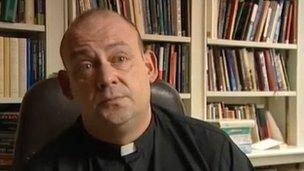Church role on 'human cost' of financial injustice
- Published

The Reverend Dr Giles Fraser resigned from his post at St Paul's Cathedral last month
The Church of England should highlight the human cost of financial injustice, the former canon chancellor of St Paul's Cathedral has said.
But the Reverend Dr Giles Fraser said he was not sure the Church should get too involved in "proposing specific answers to complex economic problems".
Dr Fraser resigned from his post at the cathedral last month.
Around 500 people linked to the protest camp against "corporate greed" near St Paul's are heading to Trafalgar Square.
Some brief scuffles broke out as a breakaway group tried to force through a police line, to try to reach Parliament Square, before rejoining the main march. Police then cordoned off Parliament Square.
Dr Fraser, who had expressed sympathy for the activists, resigned from his post over cathedral authorities' handling of the demonstration.
On BBC Radio 4's Thought for the Day on Saturday, he said: "St Paul's Cathedral is built on a deep theological fault line. On the one hand it's set within the boiler room of global capitalism, and on the other it proclaims a theological story that has some pretty fierce things to say about money and wealth.
"These two powerful tectonic plates, God and mammon, meet right under Wren's magnificent baroque masterpiece.
"It's little wonder that St Paul's can be one of the most challenging and uncomfortable places in which to do theology."
'Bigger story'
He continued: "None of which is to say that the Church is in the pocket of any political creed or economic philosophy.
"Indeed, I'm not even completely sure that the Church should go too far down the road of proposing specific answers to complex economic problems.
"Rather, it's the calling of the Church to draw attention to the human cost of financial injustice, and to reset the debate about our financial institutions firmly within the context of a bigger story about what human life is for.
"This has nothing to do with bringing down capitalism. Markets create wealth and jobs, and indeed those who want to dispense with capitalism are often better at saying what they're against than they are at proposing convincing alternatives.
"Nonetheless, part of the reason why Christianity is so suspicious of money is that the power and glamour of money can easily corral us into a narrower and narrower sense of what it is to be human."
City offer
Dr Fraser said the past two weeks had been "amongst the most stressful of my life. The arrival of the protest camp at St Paul's, the many challenges this posed, and my eventual resignation from the cathedral chapter".
The Archbishop of Canterbury has backed calls for a new tax on financial transactions - dubbed a "Robin Hood" tax.
Dr Rowan Williams said the St Paul's protests had raised awareness of the "unfinished business" of financial sector reform.
Members of the Occupy London Stock Exchange protest group have said they are considering an offer from the City of London Corporation to allow them to stay outside the cathedral until the new year.
Salaries criticised
One of the protesters, Dennis, said: "It's about saying that we are the 99%, the bottom 99%, because the top 1% of society has got control of the majority of resources.
"That is leading to an impact on our public services which is making ordinary people lose their jobs, lose their health service, lose the services that they very desperately need in the middle of this economic crisis."
Meanwhile, the Archbishop of York has criticised excessive salaries for top City executives, saying that large differences in income between rich and poor "weaken community life and make societies less cohesive".
Writing in the Yorkshire Post, external, Dr John Sentamu said that excesses in the financial sector had helped to create big inequalities, "demonstrating how scandalously unfair our society is".
The Reverend Dr Giles Fraser is taking part in Radio 3's Free Thinking Festival. Hear his thoughts on the subject of the "crisis of commitment" on Radio 3 at 22:00 GMT on Monday 7 November.
- Published5 November 2011
- Published4 November 2011
- Published3 November 2011
- Published3 November 2011
- Published2 November 2011
- Published31 October 2011
- Published27 October 2011
- Published27 October 2011